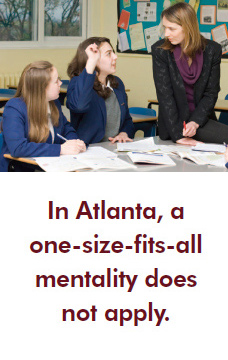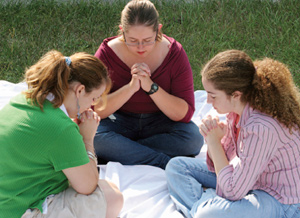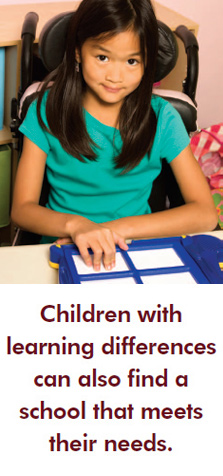Atlanta's Education Options
Choosing the education that's right for your child
by Carrie Whitney

While Atlanta abounds with top-notch public and private schools, finding the one that will be the right fit for your child and family usually involves a little legwork. With research, you'll quickly realize that your decision extends beyond choosing between public and private.
 Indeed, there are numerous ways in which schools differ from one another—educational philosophy, curriculum and teaching methods, to name just a few. In order to navigate your way through Atlanta's educational landscape to find the best school for your child, you must first understand the distinctions that exist, particularly how they relate to your child's day-to-day educational experience. For schools in Atlanta, a one-size-fits-all mentality does not apply, and many students benefit from non-standard and innovative educational approaches. For practical reasons, all of the education options in Atlanta could not be included here, so the following are just some of the choices the area has to offer.
Indeed, there are numerous ways in which schools differ from one another—educational philosophy, curriculum and teaching methods, to name just a few. In order to navigate your way through Atlanta's educational landscape to find the best school for your child, you must first understand the distinctions that exist, particularly how they relate to your child's day-to-day educational experience. For schools in Atlanta, a one-size-fits-all mentality does not apply, and many students benefit from non-standard and innovative educational approaches. For practical reasons, all of the education options in Atlanta could not be included here, so the following are just some of the choices the area has to offer.
 Charter and Magnet
Charter and Magnet
Two terms that seem to arise more frequently in Georgia's educational landscape are charter schools and magnet schools. Both charter schools and magnet schools are public programs and appear in school systems throughout the Metro area. For example, Imagine Schools, which operates charter schools around the country, has three locations in Metro Atlanta. According to the Georgia Department of Education, a charter school operates according to the terms of a charter, or contract, that has been approved by the local and state boards of education.
A school community will seek charter status if it feels its students and parents would benefit from greater autonomy. Students, parents and the school enjoy more decision-making freedom, but the school is still held accountable by the state for meeting the performance-based objectives laid out in the charter, as well as state curriculum standards. The only requirement for attending a charter school is to live within the designated area--a charter school cannot have admission criteria or charge tuition.
A magnet school or theme school often does feature admission criteria because it focuses on a particular instructional strategy that may not be suited to all students. For example, some magnet schools feature a curriculum with a heavy focus on one particular discipline, such as performing arts, technology or math and science. A variety of magnet programs is available in Metro Atlant--visit the Georgia Department of Education Web site (www.gadoe.org) to search for particular programs.
Montessori
 Many children, particularly young ones, learn best through experience. With this in mind, many parents choose a Montessori program for their children. Following the ideas of Dr. Maria Montessori, Montessori schools have sprung up around the country—there are dozens in the Metro Atlanta area alone. Mostly private, these schools have strong academics but are also concerned with the development of the whole child, and the curriculum often includes practical and community-based components. Montessori schools provide multi-age classes, and schools include preschool through middle school education. Some also have infant and toddler rooms, and a very few extend the Montessori philosophy through high school.
Many children, particularly young ones, learn best through experience. With this in mind, many parents choose a Montessori program for their children. Following the ideas of Dr. Maria Montessori, Montessori schools have sprung up around the country—there are dozens in the Metro Atlanta area alone. Mostly private, these schools have strong academics but are also concerned with the development of the whole child, and the curriculum often includes practical and community-based components. Montessori schools provide multi-age classes, and schools include preschool through middle school education. Some also have infant and toddler rooms, and a very few extend the Montessori philosophy through high school.
 Religious
Religious
Schools with a religious affiliation typically operate according to the belief that a faith-based foundation of moral values and principles prepares students to be productive citizens in society. These values are generally considered to be just as important as the subjects that are studied. Students seeking a school with a religious affiliation should certainly find what they are looking for in Metro Atlanta. Indeed, a variety of religious schools exist in the area, including Lutheran, Catholic, Methodist, Jewish and Baptist. There are also non-denominational Christian schools, as well as those with a general Christian affiliation.
International Baccalaureate
 As the world becomes increasingly globalized, many parents hope to prepare their children with an international education, so many turn to schools that offer the International Baccalaureate (IB) program, which encourages students to not only be engaged learners, but to also be interested and involved "world citizens." The Primary Years Programme focuses on the total growth of the child, while the Middle Years Programme concentrates on enhancing criticalthinking skills. Students aged 16 to 19 complete the Diploma Programme, in which they are taught to ask challenging questions, develop a strong sense of their own cultural identity and learn how to communicate successfully with people from other cultures. At the Atlanta International School, students take external exams during the last year, which can grant them college credit, and all students take a second modern language beginning with their first year in the school.
As the world becomes increasingly globalized, many parents hope to prepare their children with an international education, so many turn to schools that offer the International Baccalaureate (IB) program, which encourages students to not only be engaged learners, but to also be interested and involved "world citizens." The Primary Years Programme focuses on the total growth of the child, while the Middle Years Programme concentrates on enhancing criticalthinking skills. Students aged 16 to 19 complete the Diploma Programme, in which they are taught to ask challenging questions, develop a strong sense of their own cultural identity and learn how to communicate successfully with people from other cultures. At the Atlanta International School, students take external exams during the last year, which can grant them college credit, and all students take a second modern language beginning with their first year in the school.
 Special Needs
Special Needs
Children with learning differences can also find a school that meets their needs. If your child has difficulty in school because of problems with concentration, learning, language or behavior, he or she may benefit from attending a special needs school. Most special needs schools have fewer students in each class and a student-to-teacher ratio that allows for more one-on-one instruction. For example, at the Bedford School in Fairburn, a private school for students with learning disabilities, there are 12 or fewer students in each class.
Tutorial
For students who excel with individualized instruction, a school that implements a tutorial approach may be best. In these schools, most learning is one-to-one, and students attend few, if any, classes. Students are able to work at their own pace. However, self-discipline and a desire to attend the school are essential to succeeding in a tutorial-based environment because, for individualized schooling to work, a student must be an active participant in his or her own education.
Single-Gender
Many students find that single-gender schools help them stay focused on their studies and foster confidence. Research has shown that attending single-gender schools can improve academic achievement for some students. There has been much debate about whether boys and girls learn differently, and many advocate that single-gender schools break down gender stereotypes. One single-gender school in Atlanta, the Atlanta Girls' School, welcomes girls in grades six through 12 and strives to develop them into well-educated, self-reliant and successful young women. The all-girl environment encourages students to develop intellectual, leadership and service skills, as well as creative and athletic capabilities, free from some of the social concerns that many students face in their formative middle and high school years.







